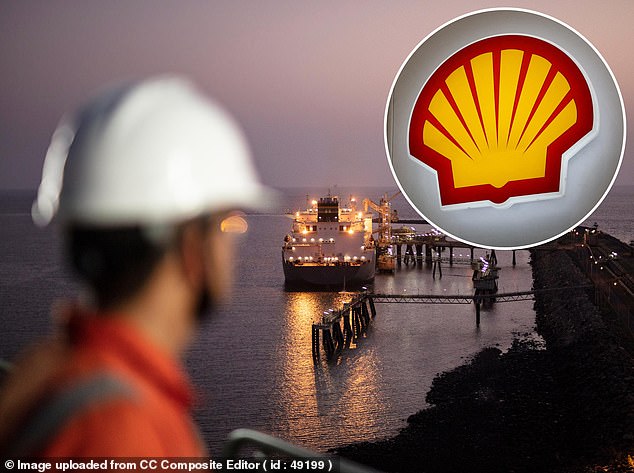Table of Contents
- Shell reported adjusted profits of $6 billion for the three months to September
- The company’s profits have been reduced by lower oil prices and refining margins.
Shell’s profits beat market forecasts in the third quarter amid strong demand for liquefied natural gas.
Europe’s largest oil company reported adjusted profits of $6 billion for the three months ended in September, compared with analysts’ average predictions of $5.4 billion.
However, this figure is still 4 percent lower than the previous quarter’s $6.3 billion and around $200 million less than the equivalent period last year.
Better than expected: Shell reported adjusted earnings of $6 billion for the three months ended in September, compared with analysts’ average predictions of $5.4 billion.
The FTSE 100 company’s profits have been hit this year by low oil prices and refining margins caused by increased production from OPEC+ countries, the slowdown in the Chinese economy and the easing of tensions throughout the Middle East.
Profits in its chemicals and products division plunged 57 percent between April and June to $463 million and $1 billion in the third quarter of 2023, while its renewable energy business more than tripled its year-on-year losses. to 162 million dollars.
However, the London-based LNG group achieved higher liquefaction volumes, mainly due to increased feed gas supplies in Nigeria and Trinidad and Tobago.
This helped its total revenue increase 22 percent, from more than $3.5 billion in the second quarter to $4.3 billion in the following three months.
It also reduced its net debts by more than $3 billion, to $35.2 billion, giving it a leverage ratio of 15.7%, despite spending $2.2 billion on dividends and $3.5 billion on buybacks. of actions.
Shell has announced a new share buyback worth $3.5 billion over the next three months and maintained its dividend at 34 cents per share.
The group’s trading update comes two days after BP revealed it beat third-quarter forecasts, recording an underlying replacement cost profit of £1.75bn.
However, this was BP’s lowest quarterly profit since 2020, when tough Covid-related travel restrictions sent oil demand tumbling.
Under CEO Murray Auchincloss, the company is prioritizing fossil fuel production and cutting its investment in renewable energy amid heightened pressure from shareholders to boost returns.
It has suspended all new offshore wind projects and signed a memorandum of understanding with the Iraqi government to develop the Kirkuk oil field.
Mark Crouch, market analyst at eToro, believes BP’s recent performance has “more to do with the indecisive direction the company is taking.”
‘It is Shell’s commitment to hydrocarbons that differentiates the oil giant from its rival. And despite the criticism, these gains seem to justify Shell holding firm.’
In March, Shell scrapped a goal to reduce the net carbon intensity of its energy products by 45 percent by 2035, blaming “uncertainty in the pace of change in the energy transition.”
Its spending on renewable energy amounted to $409 million in the third quarter, equivalent to just 8 percent of its total capital spending.
shell actions They rose 1 percent to 2,514.5 pence on Thursday morning, although they have fallen about 12 percent in the past six months.
DIY INVESTMENT PLATFORMS

AJ Bell

AJ Bell
Easy investing and ready-to-use portfolios

Hargreaves Lansdown

Hargreaves Lansdown
Free Fund Trading and Investment Ideas

interactive inverter

interactive inverter
Fixed fee investing from £4.99 per month

sax

sax
Get £200 back in trading fees

Trade 212

Trade 212
Free trading and no account commission
Affiliate links: If you purchase a This is Money product you may earn a commission. These offers are chosen by our editorial team as we think they are worth highlighting. This does not affect our editorial independence.

